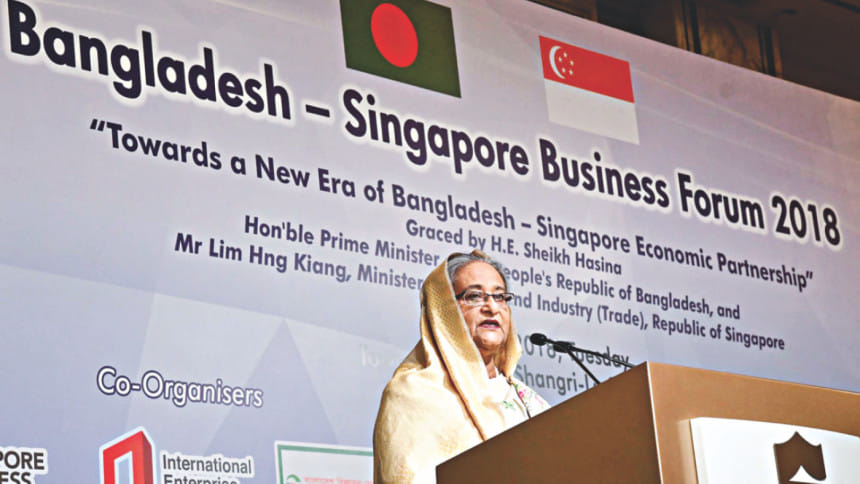‘Be our development partner’

Prime Minister Sheikh Hasina yesterday invited the business community in Singapore to be Bangladesh's partners in its journey towards economic development as the country was now transforming.
“Bangladesh has a huge young, energetic and easily trainable workforce with competitive wages. It offers opportunities for duty and quota-free access to the markets of the EU, Australia, Canada, India, Japan and New Zealand,” she said.
The prime minister was speaking at the opening of Bangladesh-Singapore Business Forum 2018, which was jointly organised by International Enterprise (IE) Singapore, Singapore Business Federation and Bangladesh Business Chamber of Singapore (BDCham) at Shangri-La Hotel, Singapore.
Sheikh Hasina announced to provide Singaporean businessmen an additional 500 acres of land in any designated space, especially in the Mirsarai economic zone at Chittagong. Singaporean Minister for Trade and Industry Lim Hng Kiang, IE Singapore acting CEO Kathy Lai and the federation Chairman Teo Siong Seng also spoke on the occasion.
Describing Bangladesh's success in the ready-made garment sector, Sheikh Hasina said the volume of textiles export was almost $30 billion in 2017, coming second after China, and the country wants to increase the amount to $50 billion by 2021.
Similarly, she said, pharmaceutical items of Bangladesh were now being exported to 120 countries, including the USA and the EU, after meeting 97 percent of domestic demands.
“Bangladesh is emerging fast as a major global hub for high quality, low-cost generic medicines,” she said. The prime minister said Bangladesh's knowledge industry, ICT and related industry are also expanding rapidly.
“Shipbuilding is yet another promising industry in Bangladesh. Our builders have drawn global attention by making world-class light to medium-sized ocean-going vessels,” she said.
She also informed the Singaporean business leaders that Bangladesh was now establishing 100 “Special Economic Zones (SEZs)” in different parts of the country as part of its initiative to accelerate industrialisation.
“We're also developing several hi-tech parks in Bangladesh for IT industries with foreign investment. We've a target to export $5 billion worth of IT goods and services by 2021,” she said.
From a humble subsistence agriculture-based economy, Bangladesh is changing to become a modern, resilient and diversified one, the prime minister said, adding, “The manufacturing sectors now occupy four-fifth of our GDP.”
She cited the prediction of Pricewater-houseCoopers in 2017 citing Bangladesh to be one of the three fastest growing global economies over the next three decades. The other two are India and Vietnam.
Leading UK daily Financial Times in its August 8, 2017 issue stated that Bangladesh has achieved an economic miracle in the past 20 years, Hasina said. “We expect half of our population to become urbanised consumers by 2030 creating a large market.”
Talking about the economy's rapid growth, she said Bangladesh's economy posted a GDP growth rate of 7.28 percent last year while the foreign currency reserve jumped to over $33 billion in 2017 from a mere $3.5 billion in 2005.
“Our export volume increased to $34.67 billion in fiscal 2016-17 from $10.52 billion in 2005-06. The poverty rate has been slashed to 22 percent now from 41.5 percent in 2005 while the life expectancy has increased to 72.4 years from 65 years in 2006,” she added. At present, the prime minister said, the per capita income has risen to $1,610 from $543 in 2005.
“Bangladesh has now ranked the 33rd largest economy in the world in terms of purchasing power parity. We're expecting the United Nations to announce Bangladesh's graduation from the LDC very soon as recognition of our recent economic performances,” she said.
“We're now transforming the nation into a knowledge-based society, driven by our 'Digital Bangladesh' Vision-2021. We've set a clear goal to become a middle-income country by 2021 and a developed one by 2041.”

 For all latest news, follow The Daily Star's Google News channel.
For all latest news, follow The Daily Star's Google News channel. 



Comments